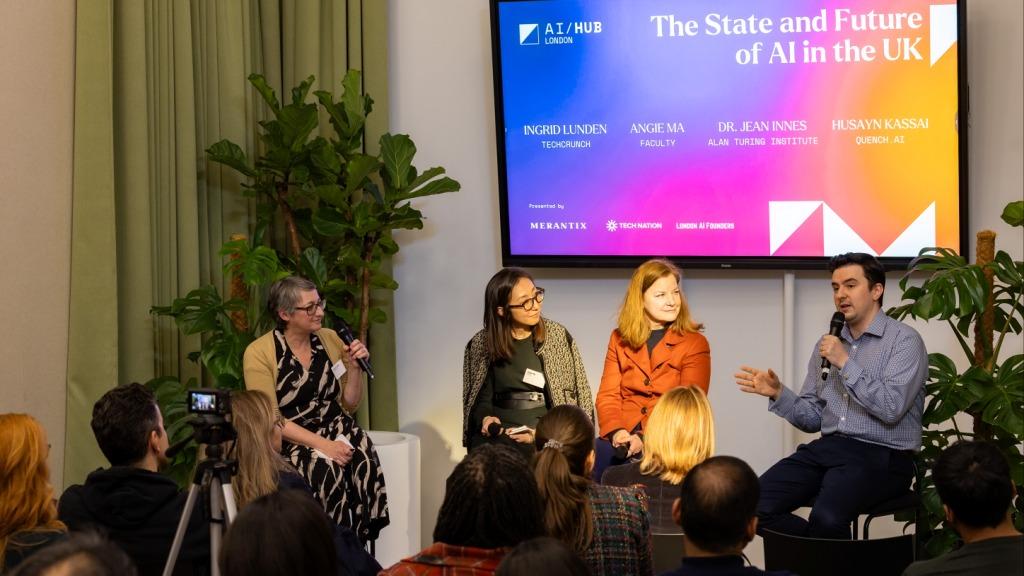Entrepreneurs say the country is an ideal testbed for AI, but brain drain risks upending progress
Prime minister Keir Starmer says the UK “cannot stand by” in fierce artificial intelligence competition. His hopes rest on an AI Opportunities Action Plan, published in January. The 50-point plan includes expediting the AI data centre build-out, creating a national data library and deploying AI-powered services across government.
An event barely a month after the AI plan’s release offered a glimpse into the thinking of those who could make Mr Starmer’s AI ambitions a reality. On February 12, a day after France’s AI summit in Paris, founders and investors gathered at the launch of a new AI hub in Farringdon, an area bordering the City of London.
Husayn Kassai, one of the backers of the ‘London AI hub’, believes that the UK has the potential to be a leader in finding viable AI use cases. “The UK’s core competency, and where it can win the race, is in the deployment of AI,” says Mr Kassai, co-founder of Onfido, an AI-based identity verification start-up acquired by US payments firm Entrust for $650m in early 2024.
As current CEO of search tool start-up Quench.ai, Mr Kassai has seen first-hand the human expertise needed to apply AI at scale in large organisations. There is “an underestimation of the professional services required to actually implement AI and move the needle beyond the baseline”, he says. The UK’s large professional services industry, start-up ecosystem and tech talent pool, continues Mr Kassai, positions the country to become an “AI in practice capital of the world” in the future.
‘Incubator Economy’
The UK has a long heritage in AI dating as far back to pioneers like computer scientist Alan Turing. But home-grown foundational AI companies have had to look overseas for funding and expansion opportunities. This includes US-listed chip designer Arm and neural network model developer DeepMind, owned by Google since 2014.
“When you get to the growth and scale-up stage, we’re not nearly as good as Silicon Valley. We’re much more risk averse,” says Tim Clement-Jones, Liberal Democrat peer and former chair of the House of Lords’ AI select committee. A February 2025 House of Lords report said that “the UK risks being an ‘incubator economy’ for other nations” due to innovative British tech firms pursuing greater growth potential in other markets.
But not everyone agrees. Nicklas Berild Lundblad, Stockholm-based director of public policy at Google DeepMind, argues the key question is how to make sure companies do not end up leaving the UK.
“Companies establishing links with more markets than one — through recruitment, sales, investments, capital — is a good thing . . . DeepMind very consciously chose to stay, because of the UK talent ecosystem and research work, but also because it felt more attuned to the UK culture,” he says.
Henry Joseph-Grant, a Northern Irish serial entrepreneur who now works at global tech event Web Summit, says the UK still faces a “huge brain drain issue” given many entrepreneurs are building teams in other countries. One example is logistics start-up Captain AI, which was founded in London but relocated to Canada in 2024.
Despite risks of the UK “rapidly falling behind” in AI, Mr Joseph-Grant is also confident that “the UK is a perfect sandbox to deploy AI, given its highly valuable, centralised data from institutions like the NHS”.
But Mr Clement-Jones argues there need to be “proper guardrails” for AI deployment in the form of “proportionate regulation” to ensure AI companies can know where to pursue growth in areas which are “not going to be frowned upon by a regulator”.
Strong Capital Commitments
Despite fears of barriers to growth, the UK is still home to well-funded AI scale-ups like autonomous driving specialist Wayve, video generator Synthesia and decision intelligence platform Quantexa. Dealroom data shows that London-based AI start-ups raised a record $3.5bn in venture capital in 2024, up by 21% on the previous record set in 2022. London was the third-largest AI ecosystem globally, ahead of Paris ($2.4bn) but behind New York ($6.1bn) and the Bay Area ($60.7bn). A report by Sequoia Capital in 2023 also found that London has the largest AI talent pool in Europe.
Unlike competitors, however, the UK is not home to major developers of large language models (LLMs), which can generate human-like text, images and video, and are the foundation of the recent AI boom. US-based LLM companies have raised billions of dollars with little to no track record. Papers by Chinese AI researchers, including at Baidu, Alibaba and Deepseek, continue to challenge the status quo. And EU countries, like France, have made a clear AI stake in a bid to compete.
The UK Labour government believes AI will help drive innovation across high-growth sectors in its industrial strategy plan and has prioritised the build out of AI infrastructure. Since 2022, the UK has been the second largest destination for data centre investment after the US, according to fDi Markets, a greenfield project announcement tracker.
LLMs Are Not Everything
The build-out of AI infrastructure bodes well for the UK, but entrepreneurs still worry about the UK’s dependence on foundational AI models from abroad. Being “fully reliant on somebody else’s [AI] model” means even if unique “last mile” AI applications are developed in the UK, AI companies elsewhere could still replicate them, says Chris Meah, CEO of School of Code, a Birmingham-based tech training provider.
The UK’s unique selling point “has to be innovation”, adds Mr Meah, including working within constraints, developing smaller AI models and adapting in specific domains. This point is echoed by others.
“People are obsessed with national security at the moment, but quite frankly, spending a huge amount of money on a sovereign large language model, I don’t think is the best use of resource,” says Mr Clement-Jones, who argues that the UK should focus on “agile” small language models.
“Large language models are not the be-all and end-all of AI,” said Jean Innes, CEO of Alan Turing Institute, at the London AI hub launch event in February. DeepSeek “broke apart the geometry of the [AI] race”, showing that a lot more can be encapsulated into small AI models, she added.
Glasgow-based start-up Malted AI is a case in point. It won a 12-month global competition in 2022 against 125 teams to develop an AI agent for Amazon’s Alexa to help users solve day-to-day tasks. Iain Mackie, Malted AI’s CEO, says “the UK has the AI chops to compete with the world”. Its world-leading universities, talent and companies “focused on the AI application layer” are reasons for this, he says, adding that the UK “regulatory burden is relatively light” compared to the EU.
Close Proximity
Back at the London AI hub, its pitch is to be a ‘centre of gravity’ for Europe’s largest, yet currently disconnected, ecosystem of AI talent and start-ups. In practice, it is a modern office with co-working, meeting and event spaces. The goal is to achieve AI success akin to Canary Wharf’s Level39, a fintech accelerator that was the birthplace of successful start-ups like digital bank Revolut.
AI is a nascent technology that needs to find very good use cases and make sure it is delivering value for organisations and society, said Angie Ma, co-founder of Faculty, a London-based AI company set up in 2014. “It’s not a trivial problem . . . We need lots of different minds, skills and expertise,” she said, adding that the London AI hub is one way of bringing together people with different backgrounds.
Carolyn Dawson, CEO of Founders Forum, another backer of the London AI hub, says the UK government’s action plan is “fairly clear”, but the proof will be in deployment. “We need that balance between positive results that we can get from progression of that technology, [which] likely outweigh some of the risk factors,” she says. The sheer capital intensity, particularly by US investors, has led to questions about where money will be made from the AI investment frenzy. The UK’s focus on applying AI in practice may prove a recipe to find that value.
“This is an evolving scene, where everyone actively needs to be thinking about where they can play best. It is less of a chess game and more of a jazz ensemble,” says Mr Lundbland of Google DeepMind.
fDi



























